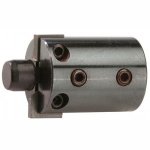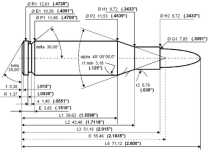Finding local mentors who can coach you on everything from what reloading looks like and how much force/feedback is expected, to shooting posture and followthrough, can be extremely helpful. You can read books and watch videos until you're stuffed entirely too full of information, but the practical side needs to watch each other do it and discuss any issues.
You are using an out of date browser. It may not display this or other websites correctly.
You should upgrade or use an alternative browser.
You should upgrade or use an alternative browser.
New to reloading - need to buy reloading die set
- Thread starter bigHUN
- Start date
- Location
- Nova Scotia
And there is the cockyness. Typical ask for advice, but go on like you already know what you are doing. People might be apt to help you more, when you listen then being arrogant and know it all. Good luck.I consider myself above average in mechanics, when I was in your age my Dad just hated that I take everything apart just to see what is inside

- Location
- Nova Scotia
Or they can contuine to be arrogant and a know it all and waste other people time.Finding local mentors who can coach you on everything from what reloading looks like and how much force/feedback is expected, to shooting posture and followthrough, can be extremely helpful. You can read books and watch videos until you're stuffed entirely too full of information, but the practical side needs to watch each other do it and discuss any issues.
I thought you could find everything online. But when reloading, holy crap old reloading manuals were a wealth of information that couldn't be found online. But yup mentors are great. What should be right online, might not work for your gun.
I used to reload alot. If your using the same rifle, no need to FL size as each previously fired shell will be perfectly sized to your chamber. Trim to length and only neck size with a lee collet neck die. The only reason to FL size your shells is so they can be used in any rifle of that caliber.
Mr no need to be sensitive and plz put your anger aside.And there is the cockyness. Typical ask for advice, but go on like you already know what you are doing. People might be apt to help you more, when you listen then being arrogant and know it all. Good luck.
I asked for advise on hardware what to buy, the reloading is a process and again that is a separate learning curve in my eyes. I have a mentor local to me.
No worries, I am overly picky for precision and reading posts and replies I am learning a lot, what left is to filter myself what I want to do.
A new Question...
Hypothetically - if I want to manage the brass neck wall thickness
and the OD is already formed to chamber (on shot shells)...
I saw some reamers for ID but have not seen any in 308 size.
How that "Reamer" shall be mounted? In a FL resizing die, or in a little "neck" turning lathe?
Edit:
I am talking about this reamer - but I don't see it in 308.
In my eyes a better concentric/runout precision if this would be part - or an addon of a FL sizing die?

What I see that pilot for neck ID could be a "reamer" as well. Any MFG makes that product?

Hypothetically - if I want to manage the brass neck wall thickness
and the OD is already formed to chamber (on shot shells)...
I saw some reamers for ID but have not seen any in 308 size.
How that "Reamer" shall be mounted? In a FL resizing die, or in a little "neck" turning lathe?
Edit:
I am talking about this reamer - but I don't see it in 308.
In my eyes a better concentric/runout precision if this would be part - or an addon of a FL sizing die?

What I see that pilot for neck ID could be a "reamer" as well. Any MFG makes that product?

Last edited:
Sorry, come again but slower? Can't follow...Add a hammer and a decent scale and it will produce better ammo than your capable of using. ...
Redding Type S FL sizing die set(2 dies) is good enough for you to load your F class ammo.
For neck turning, don't need to spend that much effort on it, you won't see that much difference for now. When you do need to turn, you would consider the iDod or AutoDod.
I noticed you are based in Aurora, I assume that's the town north of Toronto in Ontario. You can go to ORA's F class/target rifle match, talk to people and see what they use. Or your local club should have some precision rifle shooter can give you some in person advise.
For neck turning, don't need to spend that much effort on it, you won't see that much difference for now. When you do need to turn, you would consider the iDod or AutoDod.
I noticed you are based in Aurora, I assume that's the town north of Toronto in Ontario. You can go to ORA's F class/target rifle match, talk to people and see what they use. Or your local club should have some precision rifle shooter can give you some in person advise.
BEST advice on HERE so far ! jmo RJA rookie to center fire rifles.
A rookie to reloading.
Get a standard die set and learn how to use that first before you get all the fancy dies. Don’t over complicate stuff starting out.
- Location
- Nova Scotia
My father runs 20 year old classic Lee dies for 308, same dies I was taught on. He makes target ammo that produces sub moa at 100 and his best 10 shot group at 100 was .582". Holds sub moa groups out to 300.BEST advice on HERE so far ! jmo RJ
Yes you don't need fancy dies. Someone stole that 223 case. These were shot at 100 and yes by a 308. That was a fun day.
Rifle is just a FN 98 with Krieger barrel.

OP - You seem to be an analytical person, time to put on your thinking cap. There is case runout and bullet runout, their causes are different, and need to be addressed differently. Standard FL dies with expander balls can lead to case runout as the expander ball can "walk" as its being pulled through the case. This is a complex phenomenon similar to buckling, not easy to correct - neck turning may or may not help. Avoiding the expander ball solves this problem, with methods described in the previous posts.
What neck turning does is to allow for constant neck tension, assuming the balance of your reloading technique is up to par. Neck tension is one of the many variables that can affect precision ( group size) Understanding the relative dominance of all the variables is most important.
EG - Uncertainty analysis can be used to model a shooter and rifle performance. A shooter is given a perfect gun (eg laser) and manages to shoot 1 inch groups at 100 yards. He can declare himself to be a 1 moa shooter. He is given a gun that shoots 5 moa when shot in a vice. What will be the result? Hint - the answer is based upon the sides of a triangle. In this example, the governing uncertainty is the rifle. Whether the shooter has a good day or a bad day, the result is gonna be close to 5 moa.
You can break this down into all the reloading variables - powder charge and type, bullet weight, bullet geometrical variation, bullet jump, runout, neck tension, etc. What the reloader has to figure out is which of these is the governing uncertainty, and reduce these to manageable levels. Over the years, a fella can get a pretty good understanding of where to prioritize their efforts. Generally, the major uncertainties are:
1) bullet type and weight
2) powder type and charge
3) reloading technique consistency and repeatability. (Making a batch of identical cartridges)
The point of this long winded diatribe is - focus on the big ticket items. If your powder charge is messing with your barrel harmonics and contributing to 3 moa of uncertainty, playing around with lesser uncertainties such as neck tension is essentially useless. As stated in one of the posts above, learn to get good before you get fancy. Set aside neck turning for another day.
What neck turning does is to allow for constant neck tension, assuming the balance of your reloading technique is up to par. Neck tension is one of the many variables that can affect precision ( group size) Understanding the relative dominance of all the variables is most important.
EG - Uncertainty analysis can be used to model a shooter and rifle performance. A shooter is given a perfect gun (eg laser) and manages to shoot 1 inch groups at 100 yards. He can declare himself to be a 1 moa shooter. He is given a gun that shoots 5 moa when shot in a vice. What will be the result? Hint - the answer is based upon the sides of a triangle. In this example, the governing uncertainty is the rifle. Whether the shooter has a good day or a bad day, the result is gonna be close to 5 moa.
You can break this down into all the reloading variables - powder charge and type, bullet weight, bullet geometrical variation, bullet jump, runout, neck tension, etc. What the reloader has to figure out is which of these is the governing uncertainty, and reduce these to manageable levels. Over the years, a fella can get a pretty good understanding of where to prioritize their efforts. Generally, the major uncertainties are:
1) bullet type and weight
2) powder type and charge
3) reloading technique consistency and repeatability. (Making a batch of identical cartridges)
The point of this long winded diatribe is - focus on the big ticket items. If your powder charge is messing with your barrel harmonics and contributing to 3 moa of uncertainty, playing around with lesser uncertainties such as neck tension is essentially useless. As stated in one of the posts above, learn to get good before you get fancy. Set aside neck turning for another day.
Last edited:
Some of the big things bring you inside 5 MOA, then correcting fundamentals bring you inside 2, then 1, and then the little things improve that to half-MOA and so forth. But fixing any of the wee things while you're still all over the target won't make any visible difference and will just frustrate you. Having the things in order really helps, because when you're a MOA shooter and you try the next improvement and you're actually seeing that make smaller groups is a wonderful revelation!
That is not quite correct.I used to reload alot. If your using the same rifle, no need to FL size as each previously fired shell will be perfectly sized to your chamber. Trim to length and only neck size with a lee collet neck die. The only reason to FL size your shells is so they can be used in any rifle of that caliber.
Neck sizing only will eventually get you into shoulder/ chamber issues .
The reason competitors full length ( or partially full length) resize is to get their ammunition as cositant as possible in a particular rifle, I know of no competitive shooters that mix their brass between rifles.
Hall of Fame member Speedy Ganzales explains this in his various interviews with Erik Cortina.
Cat
Last week 300 M rings, several 5 shot groups from a table top tripod, maximum 0.5 MOA, didn't had Labradar data.
Two days ago 200 M rings, several 5 shot groups from a Rempel rest, 0.45 MOA, Labradar data ES 37 fps.
I don't see much POI difference between using a table top tripod or a Rest, only a convenience with the latest.
I see inconsistency's more arriving from shot brass - previous preparations. Ones I fix that step next will be playing with powder.
I will buy the tools and I have a picture how much this could cost me, but I am trying to find a single source that has all of it on a pile.
Two days ago 200 M rings, several 5 shot groups from a Rempel rest, 0.45 MOA, Labradar data ES 37 fps.
I don't see much POI difference between using a table top tripod or a Rest, only a convenience with the latest.
I see inconsistency's more arriving from shot brass - previous preparations. Ones I fix that step next will be playing with powder.
I will buy the tools and I have a picture how much this could cost me, but I am trying to find a single source that has all of it on a pile.
In a plus and minus world nominal chamber specs don’t mean diddly. Well not quite nothing; its all about ensuring that every factory cartridge will fit in every factory chamber and go bang without hurting anyone but thats about it.
Building a tool for measuring length to lands is a good step. I personally use a length of drill rod, and a couple drill bit stop collars and my dial caliper. Works and everything, but what I learned quickly is that a bullet can drive itself into the rifling leade 30-40 thou by just dropping into the barrel compared
to easing up to it it the tiniest of resistance. So you have maybe 40 thou variation operator to operator but might as well measure it to the thousandth of an inch.
Right after that you can judge your accuracy with a system that has no statistical validity at all. You can do that, we all do/ did that. I’ve been accused of liking numbers; but the only numbers that matter is the scoreboard. The winners are the guys that can dope wind, they can trade rifles with you and still beat you. Then there’s the whole .308 thing, unless you’re married to FTR you can double your talent by picking a real cartridge.
Building a tool for measuring length to lands is a good step. I personally use a length of drill rod, and a couple drill bit stop collars and my dial caliper. Works and everything, but what I learned quickly is that a bullet can drive itself into the rifling leade 30-40 thou by just dropping into the barrel compared
to easing up to it it the tiniest of resistance. So you have maybe 40 thou variation operator to operator but might as well measure it to the thousandth of an inch.
Right after that you can judge your accuracy with a system that has no statistical validity at all. You can do that, we all do/ did that. I’ve been accused of liking numbers; but the only numbers that matter is the scoreboard. The winners are the guys that can dope wind, they can trade rifles with you and still beat you. Then there’s the whole .308 thing, unless you’re married to FTR you can double your talent by picking a real cartridge.
I am a firm believer that shooting F/TR makes puts more emphasis on the shooter than F/O does, and that TR even more.The winners are the guys that can dope wind, they can trade rifles with you and still beat you. Then there’s the whole .308 thing, unless you’re married to FTR you can double your talent by picking a real cartridge.
The bottom line however , is that in a match, everyone is shooting on a level playing field in their class and in the case of F/TR even more so. The better shooter will more often than not win in the wind !
It's all good fun though. As long as a fella is on the line and putting rounds downrange!
Cat









































































